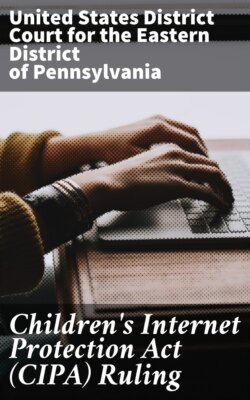Children's Internet Protection Act (CIPA) Ruling

Реклама. ООО «ЛитРес», ИНН: 7719571260.
Оглавление
United States District Court for the Eastern District of Pennsylvania. Children's Internet Protection Act (CIPA) Ruling
Children's Internet Protection Act (CIPA) Ruling
Table of Contents
Section 1721(b) of CIPA imposes conditions on a library's participation in the E-rate program. A library "having one or more computers with Internet access may not receive services at discount rates," CIPA Sec. 1721(b) (codified at 47 U.S.C. Sec. 254(h)(6)(A)(i)), unless the library certifies that it is "enforcing a policy of Internet safety that includes the operation of a technology protection measure with respect to any of its computers with Internet access that protects against access through such computers to visual depictions that are (I) obscene; (II) child pornography; or (III) harmful to minors," and that it is "enforcing the operation of such technology protection measure during any use of such computers by minors." CIPA Sec. 1721(b) (codified at 47 U.S.C. Sec. 254(h)(6)(B)). CIPA defines a "technology protection measure" as "a specific technology that blocks or filters access to visual depictions that are obscene, … child pornography, … or harmful to minors." CIPA Sec. 1703(b)(1) (codified at 47 U.S.C. Sec. 254(h)(7)(I))
IN THE UNITED STATES DISTRICT COURT
FOR THE EASTERN DISTRICT OF PENNSYLVANIA
ORDER
FOOTNOTES
Отрывок из книги
United States District Court for the Eastern District of Pennsylvania
Published by Good Press, 2019
.....
The percentage of Web pages on the indexed Web containing sexually explicit content is relatively small. Recent estimates indicate that no more than 1–2% of the content on the Web is pornographic or sexually explicit. However, the absolute number of Web sites offering free sexually explicit material is extremely large, approximately 100,000 sites. 4. American Public Libraries The more than 9,000 public libraries in the United States are typically funded (at least in large part) by state or local governments. They are frequently overseen by a board of directors that is either elected or is appointed by an elected official or a body of elected officials. We heard testimony from librarians and library board members working in eight public library systems in different communities across the country, some of whom are also plaintiffs in this case. They hailed from the following library systems: Fort Vancouver, Washington; Fulton County, Indiana; Greenville, South Carolina; a regional consortium of libraries centered in Madison, Wisconsin; Multnomah County, Oregon; Norfolk, Virginia; Tacoma, Washington; and Westerville, Ohio. The parties also took depositions from several other librarians and library board members who did not testify during the trial, and submitted a number of other documents regarding individual libraries' policies. 1. The Mission of Public Libraries, and Their Reference and Collection Development Practices
American public libraries operate in a wide variety of communities, and it is not surprising that they do not all view their mission identically. Nor are their practices uniform. Nevertheless, they generally share a common mission to provide patrons with a wide range of information and ideas. Public libraries across the country have endorsed the American Library Association's ("ALA") "Library Bill of Rights" and/or "Freedom to Read Statement," including every library testifying on behalf of the defendants in this case. The "Library Bill of Rights," first adopted by the ALA in 1948, provides, among other things, that "[b]ooks and other library resources should be provided for the interest, information, and enlightenment of all people of the community the library serves." It also states that libraries "should provide materials and information presenting all points of view on current and historical issues" and that library materials "should not be proscribed or removed because of partisan or doctrinal disapproval." The ALA's "Freedom to Read" statement, adopted in 1953 and most recently updated in July 2000, states, among other things, that "[i]t is in the public interest for publishers and librarians to make available the widest diversity of views and expressions, including those that are unorthodox or unpopular with the majority." It also states that "[i]t is the responsibility of … librarians … to contest encroachments upon th[e] freedom [to read] by individuals or groups seeking to impose their own standards or tastes upon the community at large."
.....